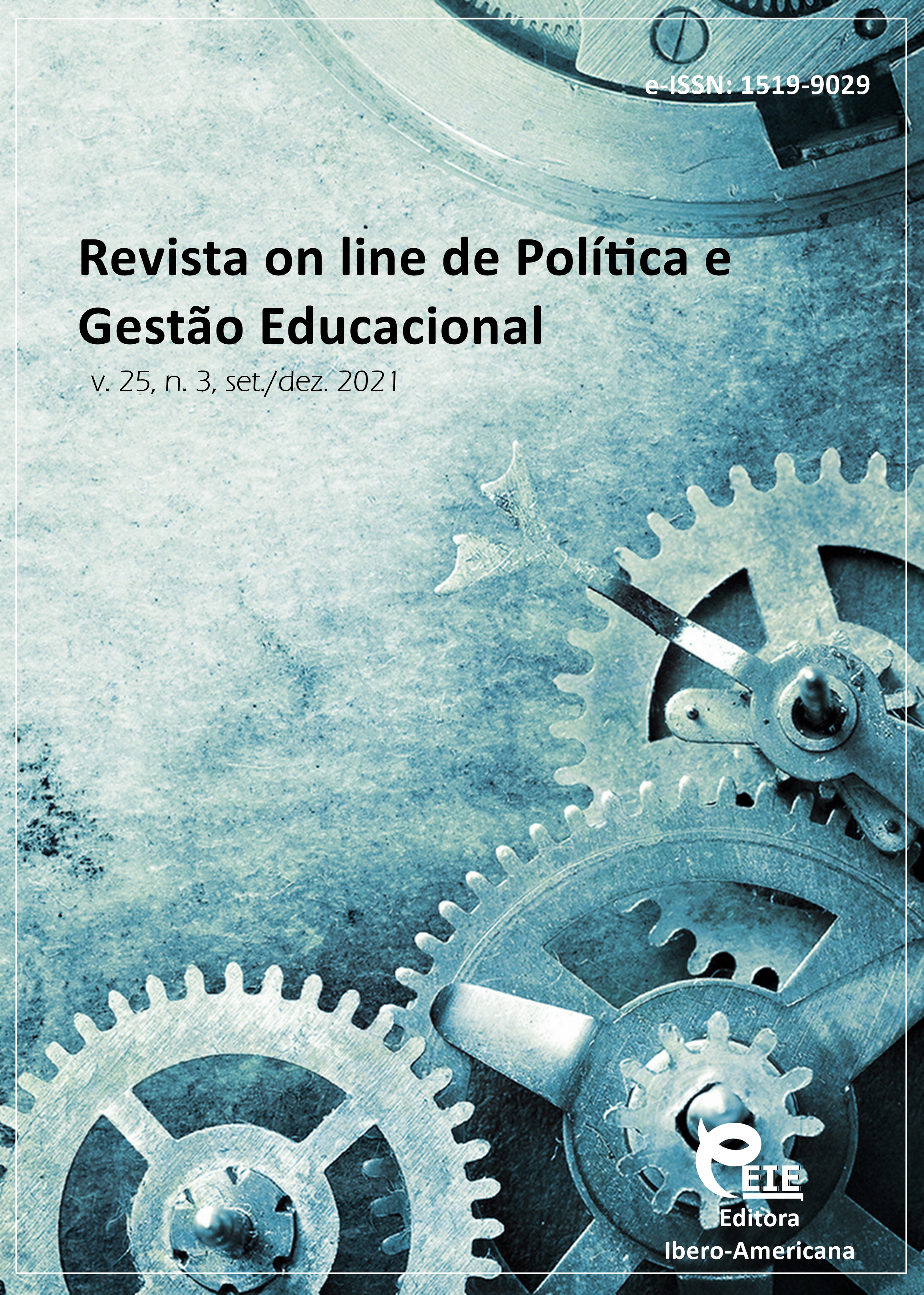O papel da informatização da educação na melhoria da eficiência do processo educativo
DOI:
https://doi.org/10.22633/rpge.v25i3.15886Palavras-chave:
Informatização, Comunicação profissional, Redes sociais, Domínio de línguas, ProfissãoResumo
O estudo visa estabelecer a eficácia da informatização do processo de aprendizagem de línguas estrangeiras na comunicação profissional e viabilizar a utilização de redes sociais, mensageiros de nuvens, plataformas educativas na preparação de futuros especialistas para a comunicação profissional num ambiente de línguas estrangeiras. Os métodos de investigação são o método da experiência pedagógica, o método de questionamento, observação, método descritivo, métodos de síntese, e análise. A hipótese principal do estudo é que a aplicação do potencial educativo das redes sociais, plataformas, mensageiros, questionários é um método eficaz de formação de um especialista com alto nível de proficiência em línguas estrangeiras na esfera profissional. O resultado do estudo determina a eficácia da utilização do processo de informatização ao nível do envolvimento de redes sociais, mensageiros para formar um elevado nível de proficiência em línguas estrangeiras por profissão.
Downloads
Referências
BRUIN, A.; TRECCANI, B.; SALA, S. Cognitive Advantage in Bilingualism An Example of Publication Bias? Psychological Science, v. 26, n. 1, p. 99–107, 2014. DOI: https://doi.org/10.1177/0956797614557866.
CAVUS, N.; IBRAHIM, D. Learning English Using Children’s Stories in Mobile Devices. British Journal of Educational Technology, v. 48, p. 625-641, 2017. DOI: https://doi.org/10.1111/bjet.12427
CHAKIR, A.; CHERGUI, M.; ANDRY, J. F. A decisional smart approach for the adoption of the IT green. Environment, Development and Sustainability, p. 1–15, 2020. DOI: https://doi.org/10.1007/s10668-020-00999-1
GILAKJANI, A. А review of EFL learners’ speaking skill and the strategies for improvement. Modern Journal of Language Teaching Methods (MJLTM), v. 6, n. 9, p. 56–63, 2016. DOI: https://doi.org/10.26655/mjltm. 2016.12.1
GOH, C. C. M.; BURNS, A. Teaching speaking: A holistic approach. New York: Cambridge, 2012. 301p.
HAPSARI, P. D.; WIRAWAN, F. The Significant Connection between Communicative Competence and Cognitive Ability in Speaking English of English Debating Team, Humaniora, v. 9, n. 2, p. 149–156, 2018. DOI: https://doi.org/10.21512/humaniora.v9i2.4492
JONES, J. F. From Silence to Talk: Cross-Cultural Ideas on Students Participation in Academic Group Discussion. English for Specific Purposes, v. 18, n. 3, p. 243–259, 1999.
KARPUSHYNA, M.; BLOSHCHYNSKYI, I.; NAKONECHNA, A.; SKYBA, K. Creating meaningful foreign language environment by means of content-based starters. Universal Journal of Educational Research, v. 7, n. 12, p. 2710–2716, 2019. DOI: https://doi.org/10.13189/ujer.2019.071219
KO, J.; SAMMONS, P.; BAKKUM, L. Effective Teaching: a review of research and evidence. CfBT Education Trust. 2013.
KÖKTÜRK, Ş. Forms and Multifunctionality of Interruptions and Simultaneous Speaking in Ordinary Talk – proposal of a Universal Model for the Evaluation of Interruptive Speech Sequences. International Journal of Linguistics, v. 4, n. 3, p. 551–571, 2012. DOI: https://doi.org/10.5296/ ijl.v4i3.2137 U
KOSTIKOVA, I. et al. Teaching English speaking for FCE: Using Facebook as a tool of instructional practice. Amazonia Investiga, v. 8, n. 22, p. 719–727, 2019.
MASON, R. Learning technologies for adult continuing education. Studies in Continuing Education, v. 28, n. 2, p. 121–133, 2006. DOI: https://doi.org/10.1080/0158 03 70600751039
NOON-URA, S. Teaching listening speaking skills to Thai students with low English proficiency. Asian EFL Journal, v. 10, n. 4, p. 173–192, 2008.
OSMANBEGOVIC, E.; SULJIC, M. Data mining approach for predicting student performance. Economic Review: Journal of Economics and Business, v. 10, n. 1, 2012.
PAN HUI. On enhancing students’ discourse competence in reading. Journal of Higher Education Reaches. 2021. DOI: https://doi.org/10.32629/ jher. v2i1.252
RABABAH, І. The Reality of Using Modern Teaching Methods in Teaching Arabic for Speakers of other Languages from Teachers’ Perspective. Journal of Social Sciences, v. 5, n. 1, p. 68–76, 2020. DOI: https:// doi.org/10.25255/jss.2020.9.1.58.94
SALGUR, S. A. The importance of the teacher in intercultural education. International Journal of Global Education, v. 2, n. 1, p. 1-5, 2013.
SCHNEIDER, K.; BERENS, J.; BURGHOFF, J. Drohende Studienabbrüche durch Frühwarnsysteme erkennen: Welche Informationen sind relevant? Zeitschrift für Erziehungswissenschaft, v. 22, n. 5, p. 1121–1146, 2019. DOI: https://doi.org/10.1007/s11618-019-00912
SICHKARENKO, K. Digital platforms: classification approaching and the role of economic development defining, Prychornomorsʹki ekonomichni studiyi, v. 35, p. 28–32, 2018.
SIM, M.; POP, A. The impact of social media on vocabulary learning: Case study Facebook. Annals of the University of Oradea. Economic Science Series, v. 23, n. 2, p. 120-130, 2014.
WANG, Y. Big opportunities and big concerns of big data in education, TechTrends, v. 60, n. 4, p. 381-384, 2016.
WILLIAMSON, B. Digital education governance: data visualization, predictive analytics and ‘real-time’ policy instruments, Journal of Education Policy, v. 31, n. 2, p. 123-141, 2016. DOI: https://doi.org/10.1080/02680 939.2015.1035758
Downloads
Publicado
Como Citar
Edição
Seção
Licença
Copyright (c) 2021 Revista on line de Política e Gestão Educacional

Este trabalho está licenciado sob uma licença Creative Commons Attribution-NonCommercial-ShareAlike 4.0 International License.
Manuscritos aceitos e publicados são de propriedade da Revista on line de Política e Gestão Educacional. É vedada a submissão integral ou parcial do manuscrito a qualquer outro periódico. A responsabilidade do conteúdo dos artigos é exclusiva dos autores. É vedada a tradução para outro idioma sem a autorização escrita do Editor ouvida a Comissão Editorial Científica.











